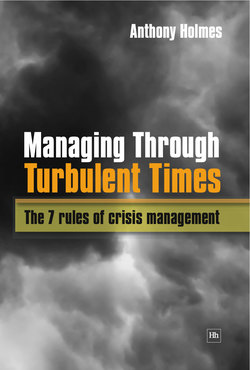Читать книгу Managing Through Turbulent Times - Anthony Holmes - Страница 11
На сайте Литреса книга снята с продажи.
Change versus control
ОглавлениеManagement is about imposing and maintaining control through the practice of compartmentalisation and compliance with a set of laws and rules. But this requires a comparatively slow pace of change that facilitates the rational and systematic evaluation of recent trends and where their continuation might lead. So the kind of rapid, unpredictable change that characterises turbulent times is anathema.
Managers embrace progress as an objective but only where it can be accomplished through incremental change. They tend to be comparatively risk averse, departmentally myopic and protective, and place a premium on reactionary rational adaptation.
The consequence of this mindset and conduct is that, through their advocacy or rejection of projects, managers tend to guide organisations away from situations where fundamental change is necessary. Radical change is turbulent and risky and is the antithesis of their preferred methodology and comfort position.
Most managers can, to some extent, predict and deal with the regular and moderate variations in the general operating climate, but few are trained adequately to deal with conditions analogous to earthquakes and hurricanes.
Their forecasts of the near future are usually based on an extrapolation of recent trends. Statistically this is a valid procedure as, for most of the time, the probability is high that the next period will be a function of preceding periods. It is also difficult to detect the green shoots of growing turbulence amongst the verdant undergrowth of a fertile market economy.
An uncertain future and concerns about the lack of control can cause managers to be biased towards the avoidance or denial of the need for fundamental or radical change. In fact the nature of managerial training, perspective and the toolkit combine to render some managers blind to the emerging signals of significant or discontinuous change.
It is sometimes also suggested that the actions of managers lead inevitably to organisational decline and are the cause of the kind of transitional events they prefer to avoid. Their desire for control imposes inflexibility on an organisation and inhibits its capacity to deform and adapt naturally or easily in response to turbulent changes in its operating environment.
Only when the need for change is imposed by the emergence of external events such as those encountered during 2008 do managers have no option but to confront turbulence and change.
Leaving aside the question of whether or not conventional managerial conduct can be a principal cause of the need for reform, it is apparent that organisational difficulties can be exacerbated by a manager’s over-reliance on the techniques that served him or her well in stable times. The response to the unusual problems that arise from an organisation’s turbulent incompatibility with its operating environment must not be limited to or even be led by the more strenuous application of these conventional processes.
The conventional processes are the scientific management tools which managers have become accustomed to using to ply their trade. These were designed to function in an age when our economic system was less interconnected and somewhat slower paced. It is not surprising, therefore, that they do not seem to work as well today as they have in the past.
The conventional practice reaches its effective limit in turbulent times when the pace of change is more rapid than the conventional toolkit can control.
It is, in part, this analysis which leads to the conclusion that managers should confine the time of their greatest influence to periods of relative stability. These are punctuated by turbulent periods of significant change (transitional events) and it is during these turbulent periods when managers are seemingly less effective and people begin to distinguish between managers and leaders and look for the latter.
